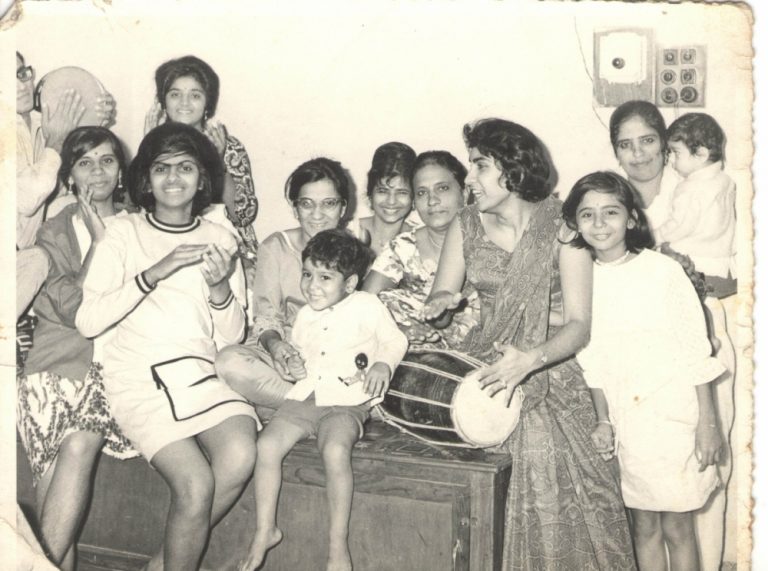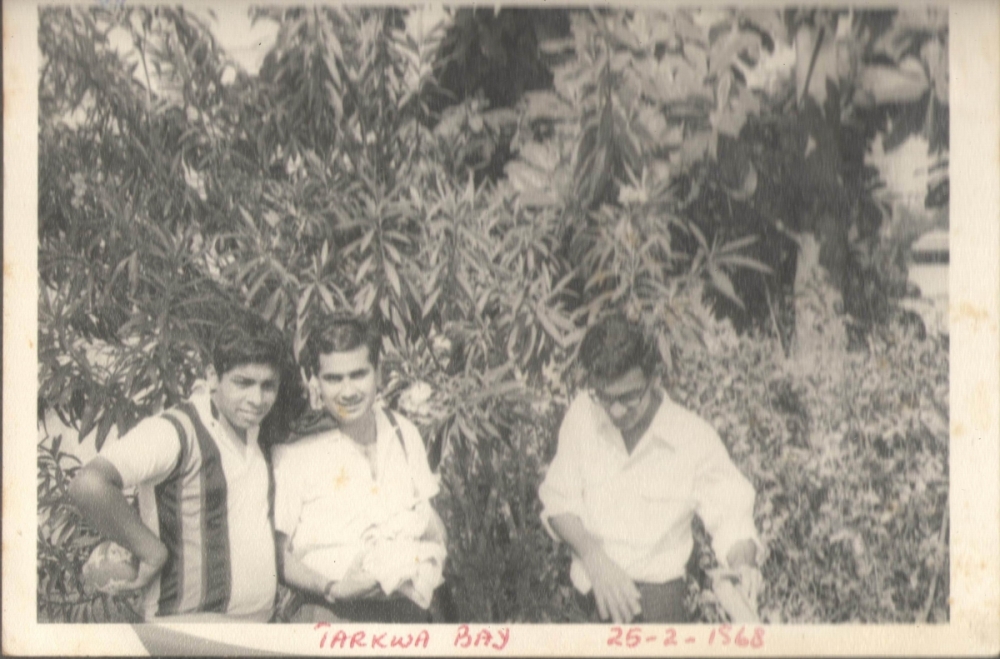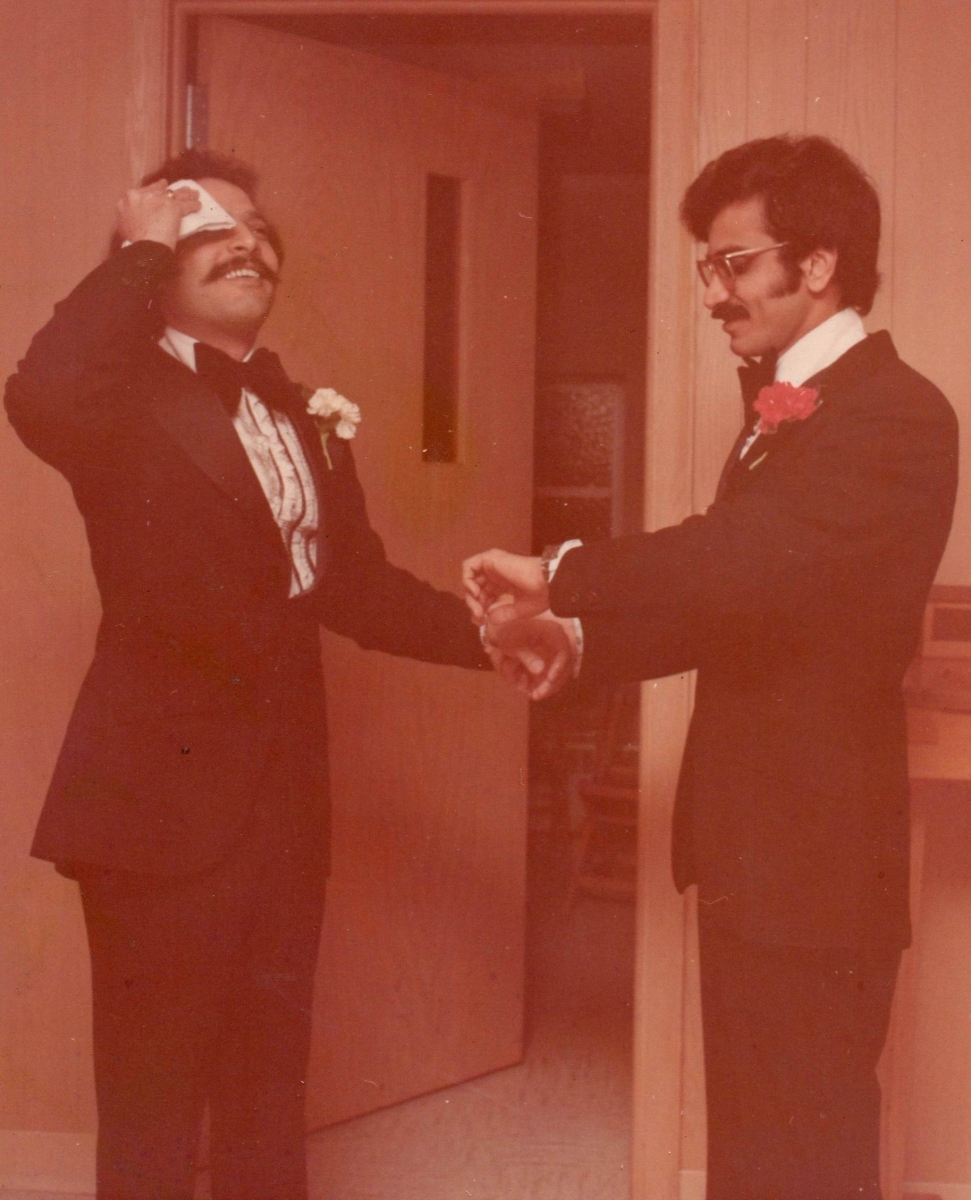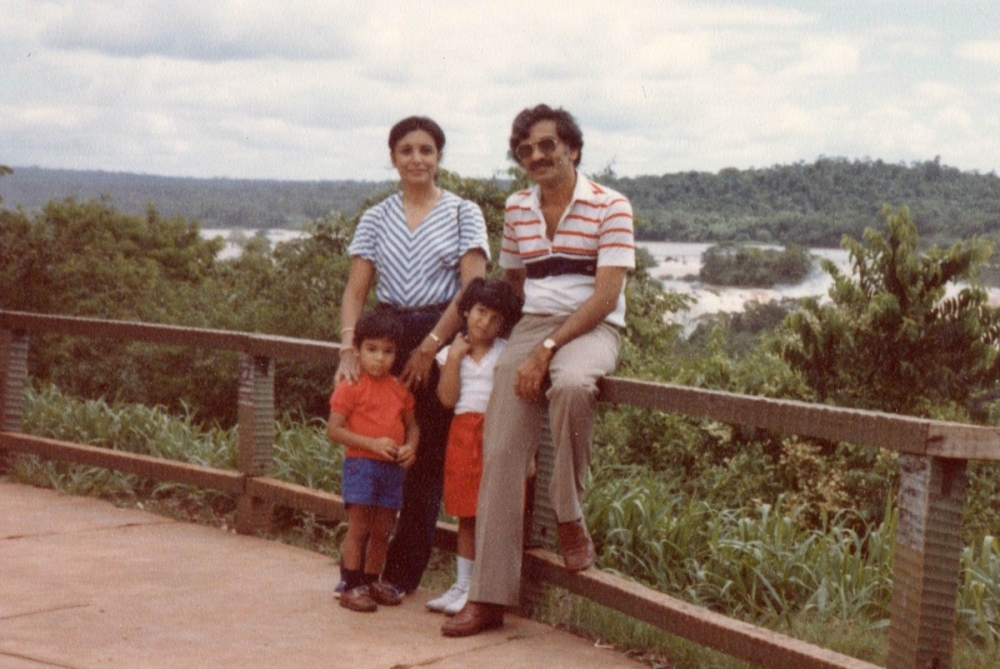
My father, my grandfather and my great-grandfather spent their entire working lives in the Dutch East Indies, as Indonesia was called until 1945.
By Tulsi Mohinani
USA: A dream comes true
Life went on like this for about a year, but the effect of the USIS movies and books was still in me. One of my cousins was in the mail-order business, and I was able to convince him to give me a job selling suits in USA. Haresh helped me to convince my dad, and he allowed me to go. So a year later I reached USA and worked for my cousin’s company for about six months selling suits. After that we started our own company, Crown Creations, with Andy Ramchandani.
Andy was a very good friend from Pune whom my mother treated like a son. She had arranged a mail-order job for him and, at the end of his three-year term selling suits in USA, he stopped in Hong Kong on the way home. When he heard that we were thinking of starting our own mail order business, Andy decided to join. So Andy and I began travelling around the US carrying three or four large suitcases of samples, each weighing 35 kg and more, staying in each city for two or three days and waiting for customers to respond to our letters and advertisements. We would show them our samples take their measurements and send the orders to Haresh in Hong Kong, along with the advance cheques from the customers. Haresh got the suits tailored and shipped them to the customers.
For me, it was such a happy feeling to be in the United States! The only thing I wanted to do was to get a green card soon so that I could live there forever. It was such an amazing country. We were strangers to our customers, staying in a hotel room, and yet they would order suits and never hesitate to write out advance payment cheques. Their confidence and generosity impressed me.
We continued this routine, narrowing our territory to the East Coast and after a few years restricted ourselves between Boston and Philadelphia, and later just New Jersey. Andy fell in love with an American girl, Carol, and they got married.

In the meanwhile, I had gone back to my studies, something I had always wanted to do. Business never interested me much, but because it was important for me to go to work at a young age and help support my family, I had never had the courage to ask my parents to send me to college. In 1973, having worked and saved a little money, I applied to go to an agricultural college in the United States. The reason I wanted to study agriculture was because I had watched documentaries about America growing huge tons of crops with modern technology. When I first visited India in the mid-1960s, there was a big drought where millions of people died because of lack of food, and India had to beg America to send grains. So I think as a young man I had patriotic dreams of studying agriculture so I could go back to India and help solve the food problem. I took admission in the State University of New York in Delhi (pronounced ‘Dell-hi’), and there I studied agriculture for two years.
On weekends I continued selling suits. I also tried to earn money in other ways, working in the school cafeteria where I remember washing 3000 plates every day, which gave me some money and also a free lunch. Then I became a supervisor on the floor where I was staying on campus and this gave me a free room. I helped the professor correct his notes and that also gave me a little money. I was doing everything I could to continue my studies.
In the three-month holiday between the first and second year, I went home to Pune and got married. Among us Bhaibands, there is a strong mindset that when you are a certain age you have to get married. I was 27 years old. It was arranged that I would meet a girl called Maya in Kwality restaurant in Pune. After fifteen or twenty minutes of chitchatting and having coffee, my mother asked me, ‘Sooka?’
In Indonesian, ‘sooka’ means ‘like’. None of us realised that Maya, a Bhaiband girl herself whose father and brother had their own business in Liberia, had been to Singapore where she had learnt a few words of Indonesian, and she knew what sooka meant. There was a glow on her face when she heard me reply, ‘Sooka!’ to my mother. So we liked each other at our very first meeting, and got engaged.
When a new match is made, our families exchange foods and gifts. My mother wanted to send a special dish to my new fiancé’s family and decided on gado gado, an Indonesian delicacy which is a type of salad with a lot of different vegetables boiled individually and topped with a tasty peanut gravy. She spent the morning preparing it and sent it over to Maya’s home. But they had never seen anything like it and just could not understand what it was! My wife Sapna, the name my family gave her when we got married, still makes us laugh by recounting the tale of how much this perplexed them. What did it mean that my mother had sent a strange salad rather than something more traditional? Was she trying to save money? How could they be expected to eat something they had never seen before and had never imagined would exist? In the end, they quietly gave it away to the cleaning woman.
Sapna and I met on the 4th of August and our wedding took place on the 14th. After the wedding, we went to Bombay and stayed for three days at my aunt’s home. That was our honeymoon, under the watchful eye of my aunt, and eating pani puri at Chowpatty. We went back to Pune and I packed my bags to return to the USA because my visa was expiring. So, just one week after my marriage, I left my wife and went back to the States. Though the families knew this was going to happen, there was still a lot of uneasiness that I may have abandoned her. This did happen sometimes, especially with boys from America, who would get married to American girls, and then under pressure from their parents would marry again in India even though they had no intention of taking the Indian wife to live with them there. In fact, one of my wife’s male cousins had done that. So Sapna’s mother was quite fearful.
That one year, as per our tradition, my wife had to stay with my parents until her visa came through and she joined me in New York on August 12, exactly two days before our first wedding anniversary. By then, I had gone back to work. With no savings left, it was not possible to continue my education. Andy and I opened a small store in New Jersey, selling Indian garments. Though we led a hand-to-mouth existence, Sapna and I look back on it as a very happy time.
In the meanwhile, my brother Jiwat had migrated from Indonesia to Colon, Panama, where his in-laws lived. He had started a business and was doing very well, and, keen that I should also grow to be a big businessman like him, invited me to join him in Panama. He would call every week to talk to me, and would tell me that there were hundred-dollar notes growing on the trees in Panama. All I had to do was come and pluck them! So one day we packed our bags and flew off to Panama.
Panama, where notes were supposed to grow on trees
It was April 1978 when we arrived in Colon. Jiwat lived in a beautiful house, and we enjoyed living with his family and grew very close to them. My brother and his partner had a textile business and for me and the partner’s brother, Suresh, they set up an electronics business, Estee, S for Suresh and T for Tulsi, which is a common way to name Indian businesses.
Colon was a tiny city of about 70,000 people and ten or twelve streets, and moving there from the USA was a big culture shock. The Indians there were not very friendly; perhaps due to the business competition. Being a small place, people were watching each other to see what they were wearing and how they were behaving, which was quite unpleasant after living a free and relaxed life in the USA. In Colon there were no restaurants, no theatres. Our sole entertainment was going out on Saturdays with a group of people and playing rummy. There was one good thing about Panama: our children were born there, our daughter Priya in February 1979 and our son Sanjay in September 1980.
For about a year after we started Estee, we sat and waited for customers to walk in and buy. But business was slow and we realised we would have to try harder. I started travelling across South America to find customers, to Ecuador, Paraguay, Argentina, Chile and Peru. I would travel for two weeks selling, then return to Panama, ship out orders and set out again after two weeks to sell and collect. This went on for about two years. I’ve seen that Sindhis pick up languages quickly. In Hong Kong I had started learning Chinese and here I was soon speaking Spanish. What was hard was collecting money. Things became worse and in the economic crisis of 1982, the South American currencies got devalued and our customers could not pay.

I remember clearly that it started in July because my mother had just passed away. My wife and children happened to be in India, but I had just come back after a month there. I was very lucky that I had seen my mother and got her blessings. Sadly, I could not go for her funeral because business was bad, we were in a crisis, and I could not afford to go back so soon.
We closed our business in Panama. Chile and Peru had become our main markets, and we had customers in these countries who owed us a lot of money. I had taken my wife and children with me on one of the trips. My wife liked Chile and readily agreed to settle there.
Chile, where the grass is always green
It was early November 1983, a week before Diwali, when I brought my family to live in Chile, a depressing time of uncertainty. Suppliers in the Far East had sent us goods in Panama, but our Chilean customers had gone bankrupt. They had bought in dollars at a certain rate of exchange but their currency had been devalued and they now owed two to three times more than what they had bought at. Unable to pay, they had been returning unsold merchandise and I had to get what I could from it. So in December 1982 I registered a new company, Silver Crown, in Chile in partnership with Hiru Datwani, a youngster based in Chile whom I knew to be an extremely nice person, honest and with good business acumen.
We rented a small warehouse for the returned goods, and opened a store in downtown Santiago which Hiru managed. Hiru was kind enough to go stay with a friend, giving us his apartment for two weeks. We were lucky to soon get a beautiful fully-furnished apartment at a reasonable rent. Happy that my family was comfortable, I turned my attention to business, but the situation continued to be difficult, and the store continued to lose money.
In 1984, my sister Sheila’s husband Nari called from Nigeria to say that he too had lost money, was looking to move, and wanted to know if Chile was a possibility. I explained that things were not too good in Chile either and that I myself was looking for other options. We decided to explore the Caribbean Islands where Sindhis had been doing business for generations, flying first to Curacao. We found that a business there would need solid investment, something neither of us could do. In Trinidad the people we met said that visas were difficult. The next stop was Grenada and we stayed in my sister Pushpa’s home and had a really good time. After all, these were resort islands, places people came to enjoy their vacations. However, we soon realised that opportunities on a small island are limited and if we were to open a store, it would be in competition with Pushpa and Prem. We went on to St. Vincent, then St. Lucia, and then the next island, and the next. The last stop was St. Martin where a Sindhi gentleman approached us at the airport and asked if we had come to buy because he had some good deals. Reluctant to move to a place where businessmen were reduced to standing in the airport and hustling for customers, we took the next flight back to Panama.
Still looking for opportunities, I made a trip to South Korea to explore the possibility of opening a branch of Mulitex there. At that time, Mulitex had branches in Taiwan, Thailand and Indonesia, and my brother was thinking of expanding. This did not work out and I returned home. Eventually, back in Chile, Nari said to me, ‘This is a place where people are constantly watering their lawns. The grass is always green. How can such a place be bad?’ We both decided to stay on and see what Chile had in store for us.
In Panama, I had been dealing in electronics: televisions, radios, and some gift items. At first they came from Japan; then Taiwan and South Korea began manufacturing. When these countries became expensive, the cheap products from China served the needs of the Latin American markets.
In Panama, we had purchased from the Far East and supplied all over South America with Peru and Chile becoming our main markets. Now in Chile, I was buying from China and Panama, and supplying locally. My store in Santiago was named ‘Muli’, in memory of my mother, whose blessings have fuelled my growth and success. The store was near the Estacion Central and stocked sundry items, from umbrellas to bedcovers to clocks.
In 1985, the economic situation started improving gradually. The big break came when dollar stores became popular, selling a huge range of Chinese products for 500 pesos and 1000 pesos, equivalent to USD1 and USD2. I started importing in bulk at very low prices and selling to the stores and business grew. I opened a store of my own, Todo a Mil (Everything for a Dollar), then another, then another and then started franchising. Within a year, I had eleven stores of my own and three franchised. But this rapid speed of growth made me nervous. I sold the three franchised stores to the franchisees, and over time sold the rest to people who were working for me, retaining just one store and concentrating on wholesale of the dollar items.

In time I was able to purchase my own home. When the next opportunity to buy real estate came I took it and over time bought a number of old houses in a nearby residential area. It had the potential for commercial growth so I set up a showroom and rented the stores at low rents to motivate store-keepers to move there. As the number of stores increased, I set up buildings, a parking lot, warehouses and a wholesale mall. Over time the area has become wholly commercial, and my office and showroom continue to be there. With seven thousand items, wholesaling to the dollar stores continues to be my main business.
My business in Iquique, a beautiful town in the north of Chile, started when I acquired a warehouse in the free trade zone there in an auction bid. The zone was established in the mid-1970s by Augusto Pinochet who took control of Chile with a violent coup against the pro-Communist government of the time. The new government began to nurture the economy with policies formulated by a group of young US-educated economists who came to be known as the Chicago Boys. One of the initiatives was a zone for free trade in Iquique, a town that Pinochet is said to have loved. Jiwat and I went into partnership with K.G. Samtani, who had worked with our father in Tanjung Pinang and all these years had been like a brother to us. In the early 1990s, I opened another business in Iquique, Metro, and acquired another two warehouses. If I have been successful in business, it is largely because I have been lucky to have good people who worked with me all these years both in Santiago and Iquique. Manoj, my cousin Kunj’s son joined me when he was just 17 years old and today, 30 years later, he continues to be my right hand.
About seven years after I came to Chile, in a much better financial situation, I went back to the suppliers in Hong Kong and Japan to whom I owed money when I was in Panama. They knew that it was not a case of fraud and that I had lost everything in the crisis. I told the suppliers that I was now better off and ready to start repaying them in monthly installments from what I was earning. They were surprised because they had not expected this at all, and when I requested them to waive the interest owed they did so readily. My father had always impressed on us the importance of being honest and paying one’s dues and my brothers and I have always done this.
___________________
Courtesy: Sahapedia
Click here for Part-I , Part-II